Collapsology books: Difference between revisions
| Line 4: | Line 4: | ||
[[File:Humanitys-Last-Stand.jpg|240px|right]] | [[File:Humanitys-Last-Stand.jpg|240px|right]] | ||
=== Humanity's Last Stand, Schuller | === Humanity's Last Stand, Schuller === | ||
''Are we as a species headed towards extinction? As our economic system renders our planet increasingly inhospitable to human life, powerful individuals fight over limited resources, and racist reaction to migration strains the social fabric of many countries. How can we retain our humanity in the midst of these life-and-death struggles?'' | ''Are we as a species headed towards extinction? As our economic system renders our planet increasingly inhospitable to human life, powerful individuals fight over limited resources, and racist reaction to migration strains the social fabric of many countries. How can we retain our humanity in the midst of these life-and-death struggles?'' | ||
| Line 18: | Line 18: | ||
[[File:X-Risk.jpg|240px|left]] | [[File:X-Risk.jpg|240px|left]] | ||
=== X-Risk, Moynihan | === X-Risk, Moynihan === | ||
''From forecasts of disastrous climate change to prophecies of evil AI superintelligences and the impending perils of genome editing, our species is increasingly concerned with the prospects of its own extinction. With humanity's future on this planet seeming more insecure by the day, in the twenty-first century, existential risk has become the object of a growing field of serious scientific inquiry. But, as Thomas Moynihan shows in X-Risk, this preoccupation is not exclusive to the post-atomic age of global warming and synthetic biology. Our growing concern with human extinction itself has a history.'' | ''From forecasts of disastrous climate change to prophecies of evil AI superintelligences and the impending perils of genome editing, our species is increasingly concerned with the prospects of its own extinction. With humanity's future on this planet seeming more insecure by the day, in the twenty-first century, existential risk has become the object of a growing field of serious scientific inquiry. But, as Thomas Moynihan shows in X-Risk, this preoccupation is not exclusive to the post-atomic age of global warming and synthetic biology. Our growing concern with human extinction itself has a history.'' | ||
| Line 35: | Line 35: | ||
[[File:The-Precipice.jpg|240px|right]] | [[File:The-Precipice.jpg|240px|right]] | ||
=== The Precipice, Ord | === The Precipice, Ord === | ||
''If all goes well, human history is just beginning. Our species could survive for billions of years – enough time to end disease, poverty, and injustice, and to flourish in ways unimaginable today. But this vast future is at risk. With the advent of nuclear weapons, humanity entered a new age, where we face existential catastrophes – those from which we could never come back. Since then, these dangers have only multiplied, from climate change to engineered pathogens and artificial intelligence. If we do not act fast to reach a place of safety, it will soon be too late.'' | ''If all goes well, human history is just beginning. Our species could survive for billions of years – enough time to end disease, poverty, and injustice, and to flourish in ways unimaginable today. But this vast future is at risk. With the advent of nuclear weapons, humanity entered a new age, where we face existential catastrophes – those from which we could never come back. Since then, these dangers have only multiplied, from climate change to engineered pathogens and artificial intelligence. If we do not act fast to reach a place of safety, it will soon be too late.'' | ||
| Line 50: | Line 50: | ||
[[File:How-Everything-Can-Collapse.jpeg|240px|left]] | [[File:How-Everything-Can-Collapse.jpeg|240px|left]] | ||
=== How Everything can Collapse === | === How Everything can Collapse, Servigne and Stevens === | ||
''What if our civilization were to collapse? Not many centuries into the future, but in our own lifetimes? Most people recognize that we face huge challenges today, from climate change and its potentially catastrophic consequences to a plethora of socio-political problems, but we find it hard to face up to the very real possibility that these crises could produce a collapse of our entire civilization. Yet we now have a great deal of evidence to suggest that we are up against growing systemic instabilities that pose a serious threat to the capacity of human populations to maintain themselves in a sustainable environment.'' | ''What if our civilization were to collapse? Not many centuries into the future, but in our own lifetimes? Most people recognize that we face huge challenges today, from climate change and its potentially catastrophic consequences to a plethora of socio-political problems, but we find it hard to face up to the very real possibility that these crises could produce a collapse of our entire civilization. Yet we now have a great deal of evidence to suggest that we are up against growing systemic instabilities that pose a serious threat to the capacity of human populations to maintain themselves in a sustainable environment.'' | ||
| Line 64: | Line 64: | ||
[[File:End-of-the-Megamachine.jpg|240px|right]] | [[File:End-of-the-Megamachine.jpg|240px|right]] | ||
=== The End of the Megamachine === | === The End of the Megamachine, Scheidler === | ||
''The End of the Megamachine brings to light the roots of the destructive forces threatening the future of humankind today. While the first part leads us to the very origins of economic, military and ideological power 5000 years ago, the second and key part retraces the formation and expansion of the modern world-system through the last 500 years. Dismantling Western progress mythologies, Scheidler shows how the logics of endless capital accumulation have devastated both human societies and ecosystems from the outset.'' | ''The End of the Megamachine brings to light the roots of the destructive forces threatening the future of humankind today. While the first part leads us to the very origins of economic, military and ideological power 5000 years ago, the second and key part retraces the formation and expansion of the modern world-system through the last 500 years. Dismantling Western progress mythologies, Scheidler shows how the logics of endless capital accumulation have devastated both human societies and ecosystems from the outset.'' | ||
| Line 76: | Line 76: | ||
[[File:Another-End-Of-The-World-Is-Possible.jpg|240px|left]] | |||
=== Another End of the World is Possible. Chappele, Servigne and Stevens === | |||
''The critical situation in which our planet finds itself is no longer in doubt. Some things are already collapsing while others are beginning to do so, increasing the possibility of a global catastrophe that would mean the end of the world as we know it.'' | |||
''As individuals, we are faced with a daily deluge of bad news about the worsening situation, preparing ourselves to live with years of deep uncertainty about the future of the planet and the species that inhabit it, including our own. How can we cope? How can we project ourselves beyond the present, think bigger and find ways not just to survive the collapse but to live it? | |||
In this book, the sequel to How Everything Can Collapse, the authors show that a change of course necessarily requires an inner journey and a radical rethinking of our vision of the world. Together these might enable us to remain standing during the coming storm, to develop a new awareness of ourselves and of the world and to imagine new ways of living in it. Perhaps then it will be possible to regenerate life from the ruins, creating new alliances in differing directions – with ourselves and our inner nature, between humans, with other living beings and with the earth on which we dwell.'' | |||
Revision as of 08:12, 27 June 2024
Linkdump (booklist)
Go through and give each of these a formal title, description, publisher and publishing date etc
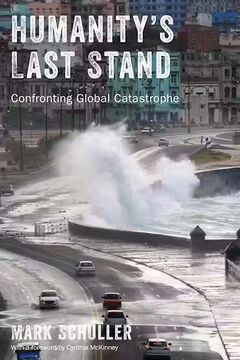
Humanity's Last Stand, Schuller
Are we as a species headed towards extinction? As our economic system renders our planet increasingly inhospitable to human life, powerful individuals fight over limited resources, and racist reaction to migration strains the social fabric of many countries. How can we retain our humanity in the midst of these life-and-death struggles?
Humanity’s Last Stand dares to ask these big questions, exploring the interconnections between climate change, global capitalism, xenophobia, and white supremacy. As it unearths how capitalism was born from plantation slavery and the slaughter of Indigenous people, it also invites us to imagine life after capitalism. The book teaches its readers how to cultivate an anthropological imagination, a mindset that remains attentive to local differences even as it identifies global patterns of inequality and racism.
Surveying the struggles of disenfranchised peoples around the globe from frontline communities affected by climate change, to #BlackLivesMatter activists, to Indigenous water protectors, to migrant communities facing increasing hostility, anthropologist Mark Schuller argues that we must develop radical empathy in order to move beyond simply identifying as “allies” and start acting as “accomplices.” Bringing together the insights of anthropologists and activists from many cultures, this timely study shows us how to stand together and work toward a more inclusive vision of humanity before it’s too late.
https://www.rutgersuniversitypress.org/humanitys-last-stand/9781978820876/
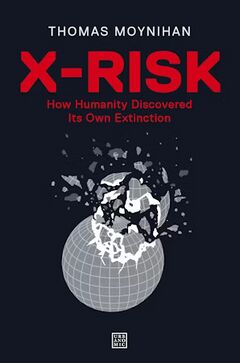
X-Risk, Moynihan
From forecasts of disastrous climate change to prophecies of evil AI superintelligences and the impending perils of genome editing, our species is increasingly concerned with the prospects of its own extinction. With humanity's future on this planet seeming more insecure by the day, in the twenty-first century, existential risk has become the object of a growing field of serious scientific inquiry. But, as Thomas Moynihan shows in X-Risk, this preoccupation is not exclusive to the post-atomic age of global warming and synthetic biology. Our growing concern with human extinction itself has a history.
Tracing this untold story, Moynihan revisits the pioneers who first contemplated the possibility of human extinction and stages the historical drama of this momentous discovery. He shows how, far from being a secular reprise of religious prophecies of apocalypse, existential risk is a thoroughly modern idea, made possible by the burgeoning sciences and philosophical tumult of the Enlightenment era. In recollecting how we first came to care for our extinction, Moynihan reveals how today's attempts to measure and mitigate existential threats are the continuation of a project initiated over two centuries ago, which concerns the very vocation of the human as a rational, responsible, and future-oriented being.
https://mitpress.mit.edu/9781913029845/
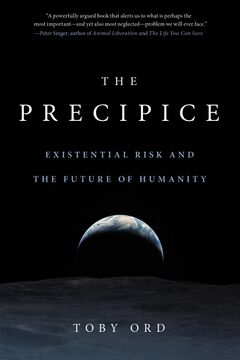
The Precipice, Ord
If all goes well, human history is just beginning. Our species could survive for billions of years – enough time to end disease, poverty, and injustice, and to flourish in ways unimaginable today. But this vast future is at risk. With the advent of nuclear weapons, humanity entered a new age, where we face existential catastrophes – those from which we could never come back. Since then, these dangers have only multiplied, from climate change to engineered pathogens and artificial intelligence. If we do not act fast to reach a place of safety, it will soon be too late.
Drawing on over a decade of research, The Precipice explores the cutting-edge science behind the risks we face. It puts them in the context of the greater story of humanity: showing how ending these risks is among the most pressing moral issues of our time. And it points the way forward, to the actions and strategies that can safeguard humanity.
An Oxford philosopher committed to putting ideas into action, Toby Ord has advised the US National Intelligence Council, the UK Prime Minister's Office, and the World Bank on the biggest questions facing humanity. In The Precipice, he offers a startling reassessment of human history, the future we are failing to protect, and the steps we must take to ensure that our generation is not the last.
https://www.hachettebookgroup.com/titles/toby-ord/the-precipice/9780316484893/?lens=hachette-books
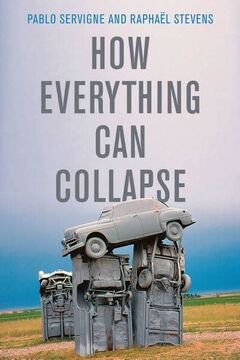
How Everything can Collapse, Servigne and Stevens
What if our civilization were to collapse? Not many centuries into the future, but in our own lifetimes? Most people recognize that we face huge challenges today, from climate change and its potentially catastrophic consequences to a plethora of socio-political problems, but we find it hard to face up to the very real possibility that these crises could produce a collapse of our entire civilization. Yet we now have a great deal of evidence to suggest that we are up against growing systemic instabilities that pose a serious threat to the capacity of human populations to maintain themselves in a sustainable environment.
In this important book, Pablo Servigne and Raphaël Stevens confront these issues head-on. They examine the scientific evidence and show how its findings, often presented in a detached and abstract way, are connected to people’s ordinary experiences – joining the dots, as it were, between the Anthropocene and our everyday lives. In so doing they provide a valuable guide that will help everyone make sense of the new and potentially catastrophic situation in which we now find ourselves. Today, utopia has changed sides: it is the utopians who believe that everything can continue as before, while realists put their energy into making a transition and building local resilience. Collapse is the horizon of our generation. But collapse is not the end – it’s the beginning of our future. We will reinvent new ways of living in the world and being attentive to ourselves, to other human beings and to all our fellow creatures.
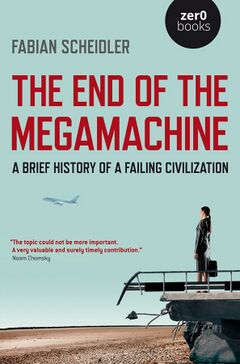
The End of the Megamachine, Scheidler
The End of the Megamachine brings to light the roots of the destructive forces threatening the future of humankind today. While the first part leads us to the very origins of economic, military and ideological power 5000 years ago, the second and key part retraces the formation and expansion of the modern world-system through the last 500 years. Dismantling Western progress mythologies, Scheidler shows how the logics of endless capital accumulation have devastated both human societies and ecosystems from the outset.
With the growing instability and looming collapse of the Megamachine in the 21st century new dangers as well as new possibilities for systemic change open up.
The End of the Megamachine shifts the point of view from a “history of the winners” to a “people’s history”. It highlights the key role of the “metallurgical complex” linking military and financial systems and fostering the evolution of technocratic visions of the world from antiquity to modernity. A particular focus is the history of “apocalyptic thinking” that has been formative for Western culture, both for capitalist projections of a “New World” and for anti-systemic movements.
https://www.megamaschine.org/en/
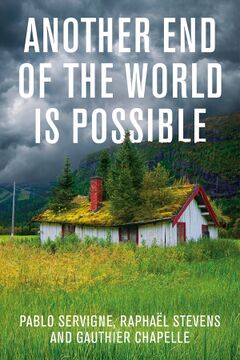
Another End of the World is Possible. Chappele, Servigne and Stevens
The critical situation in which our planet finds itself is no longer in doubt. Some things are already collapsing while others are beginning to do so, increasing the possibility of a global catastrophe that would mean the end of the world as we know it.
As individuals, we are faced with a daily deluge of bad news about the worsening situation, preparing ourselves to live with years of deep uncertainty about the future of the planet and the species that inhabit it, including our own. How can we cope? How can we project ourselves beyond the present, think bigger and find ways not just to survive the collapse but to live it? In this book, the sequel to How Everything Can Collapse, the authors show that a change of course necessarily requires an inner journey and a radical rethinking of our vision of the world. Together these might enable us to remain standing during the coming storm, to develop a new awareness of ourselves and of the world and to imagine new ways of living in it. Perhaps then it will be possible to regenerate life from the ruins, creating new alliances in differing directions – with ourselves and our inner nature, between humans, with other living beings and with the earth on which we dwell.
- https://www.politybooks.com/bookdetail?book_slug=another-end-of-the-world-is-possible-living-the-collapse-and-not-merely-surviving-it--9781509544653
- https://cup.columbia.edu/book/the-collapse-of-western-civilization/9780231169547
- https://global.oup.com/academic/product/global-catastrophic-risks-9780199606504?cc=us&lang=en&
- https://www.penguinrandomhouse.com/books/188600/pandoras-seed-by-spencer-wells/
- https://www.hup.harvard.edu/books/9780674032514
- https://www.penguin.co.uk/books/1155/the-revenge-of-gaia-by-james-lovelock/9780141025971
- https://www.penguinrandomhouse.com/books/288954/collapse-by-jared-diamond/
- https://www.goodreads.com/book/show/36690231-l-entraide
- https://www.routledge.com/The-2030-Spike-Countdown-to-Global-Catastrophe-1st-Edition/Mason/p/book/9781138384095
- https://www.cambridge.org/ch/universitypress/subjects/archaeology/archaeological-theory-and-methods/collapse-complex-societies?format=PB&isbn=9780521386739
- https://www.press.uillinois.edu/books/?id=p009884
- https://www.clubofrome.org/publication/the-limits-to-growth/
Most taken from: https://www.collapsologie.fr/en/books/